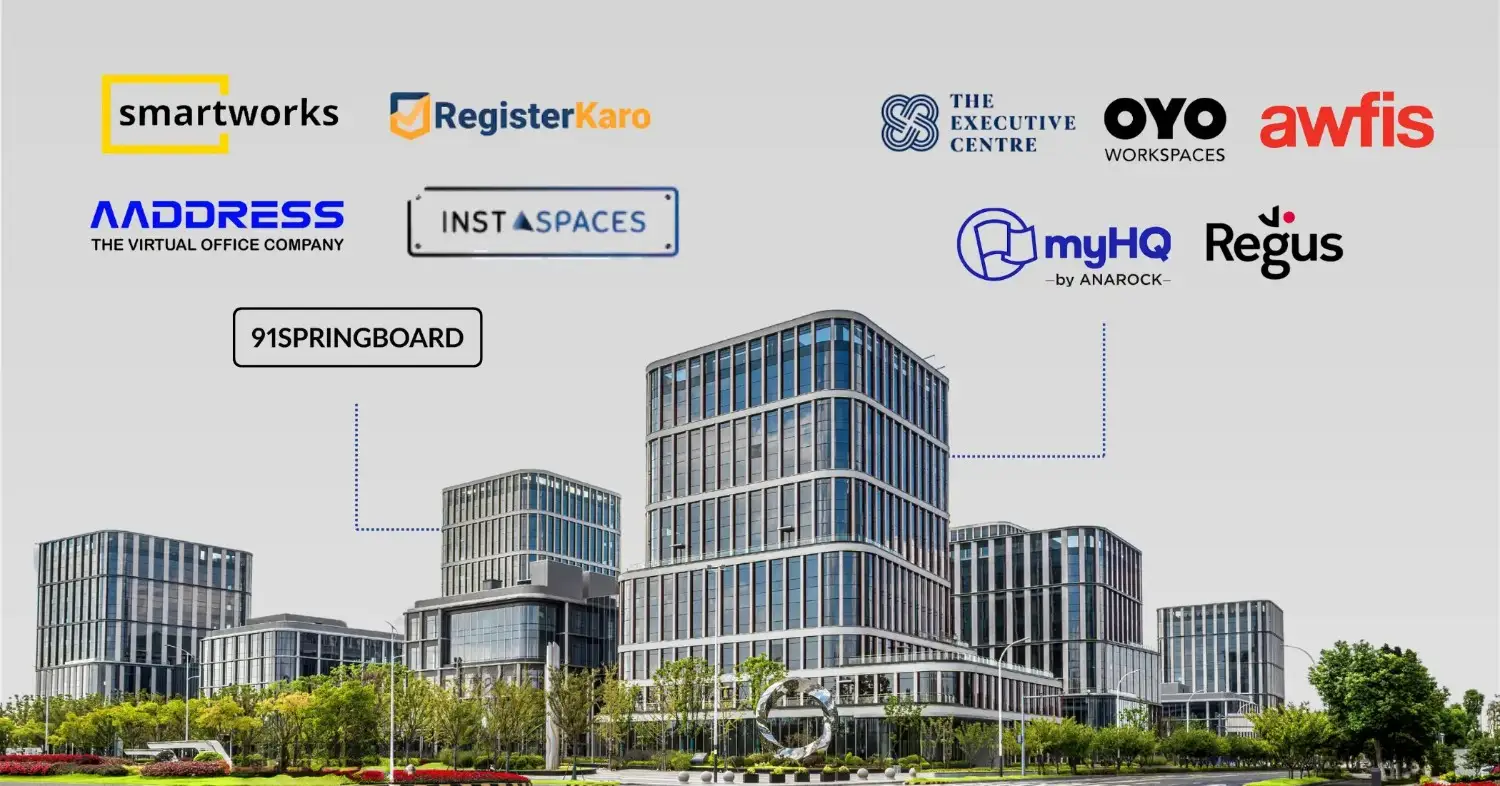
The way we work is evolving rapidly. For startups and SMEs in India, the traditional office is no longer the only choice. Rising real estate costs, remote work, and digital-first teams have made entrepreneurs ask: between a coworking space vs a virtual office, which setup suits your business best? A coworking space encourages collaboration and networking, while a virtual office keeps costs lean and provides flexibility. Each option has its unique advantages, and the right pick depends on your business goals, team size, and growth trajectory.
A virtual office provides a professional business address, mail handling, and call management without the need for a full-time physical workspace, keeping costs minimal. In contrast, a coworking space offers hot desks or dedicated offices, full amenities, and opportunities for networking and team collaboration.
In this blog, we’ll break down the key differences, costs, and benefits of virtual offices and coworking spaces. This will help you choose the best option, or even a hybrid approach, that suits your startup or SME perfectly.
What is a Virtual Office?
A virtual office setup provides a professional business presence without the need for a permanent physical workspace. In simple terms, it lets your business look established and credible while you, or your team, work remotely. Think of it as having all the perks of an office, without paying for a full-time desk.

Services typically include a business address, mail handling, call answering, and access to meeting rooms on demand, giving you flexibility and professionalism at a fraction of the cost.
Typical Features of a Virtual Office in India
In the Indian context, most virtual offices offer:
- Prestigious business address in a commercial area or business district
- Mail handling and forwarding, so that important documents reach you wherever you are
- Professional call answering in your company’s name
- Occasional access to meeting or conference rooms for client meetings
- Minimal or no physical desk, keeping operational costs low
A virtual office in India is commonly used for:
- Company Registration (MCA), establish your business with a credible address.
- GST Registration, ensure documents are GST-compliant for legal invoicing.
- Business communication and mail handling, manage correspondence efficiently without a full-time office.
When a Virtual Office is a Good Fit
A virtual office works best if you:
- Operate primarily from home or while on the move.
- Have a lean budget and want to save on rent and utilities.
- Need a credible business address for registration, client trust, or government compliance.
- Don’t require a daily physical workspace for your team.
Example: Suppose Priya runs a digital marketing startup from her home in Bangalore. She doesn’t need a full office but wants a prestigious business address in Koramangala to impress clients. With a virtual office in Koramangala, she gets mail handling, a professional receptionist to answer calls, and access to a conference room whenever she meets clients, all without paying hefty monthly rent.
In short, a virtual office lets you run a professional, credible business with maximum flexibility and minimum cost, perfect for startups and SMEs in India looking to stay agile.
What is a Coworking Space?
A coworking space is a shared physical workspace where freelancers, startups, and small teams work alongside a community of professionals. Unlike a virtual office, a coworking space gives you a dedicated place to work, while also offering the flexibility and amenities of a modern office. Think of it as a professional hub designed for collaboration, networking, and productivity.
Typical Features of a Coworking Space in India
Most coworking spaces in India provide:
- Hot desks (shared seating) or dedicated desks for your team
- Meeting and conference rooms for client interactions or team discussions
- High-speed internet, reception, and lounge areas
- Community events and networking opportunities to connect with other professionals
When a Coworking Space is a Good Fit
Coworking spaces are ideal if you:
- Need daily access to a physical workspace for yourself or your team
- Value community, networking, and collaboration
- Frequently meet clients or partners in a professional setting
- Want the structure and amenities of an office without long-term lease commitments
Example: Rahul runs a tech startup in Mumbai and has a small team of five. While they could work from home, they need a professional space to meet clients, collaborate on projects, and access high-speed internet. By choosing a coworking space in Bandra, they get dedicated desks, meeting rooms, and networking events, all without committing to a long-term office lease.
Virtual Office vs Coworking Space: Which is Better for Your Startup or SME?
When deciding between a coworking space and a virtual office, understanding the key differences can help you choose the right setup. The following table highlights the main aspects of each model, with a focus on the Indian startup and SME context:
| Dimension | Virtual Office | Coworking Space | Commentary (India) |
| Primary Use | Mail handling, call answering, and occasional meeting rooms | Physical workspace for teams and client meetings | Virtual offices suit Tier-2 startups on a budget; coworking spaces thrive in metros like Mumbai, Bangalore, and Delhi. |
| Physical Desk | Minimal or none; work remotely | Hot/desks or dedicated desks; daily presence | Coworking spaces provide quality desks and amenities; virtual offices eliminate rent overheads. |
| Business Address | Prestigious address for registration and trust | Setting up a virtual office in prime areas like Bandra (Mumbai) adds credibility without rent; coworking address double as office/mailing addresses. | High: networking, workshops, collaboration |
| Amenities | High: networking, workshops, collaboration | Internet, reception, lounges, printers, meeting rooms | Coworking offers full infrastructure; virtual offices provide essential services with pay-per-use rooms. |
| Community | Limited, mostly remote | High; networking, workshops, collaboration | Coworking fosters mentor networks and partnerships; virtual office users rely on digital networking. |
| Cost | ₹2,000–₹5,000/month | ₹5,000–₹20,000/month per desk | Virtual offices are budget-friendly; coworking costs vary by location and amenities. |
| Scalability | Easy multi-city expansion | Requires physical expansion | Virtual offices scale geographically at low cost; coworking needs plan upgrades or extra desks. |
| Best For | Freelancers, solopreneurs, remote startups | SMEs needing daily access, client meetings, structured workspace | Early-stage startups prefer virtual offices; SMEs with 3–20 members benefit from coworking for productivity and networking. |
Have questions or need guidance on choosing the right option for your startup or SME? Reach out to RegisterKaro today, and our experts will help you pick the best solution with pricing and legal compliance details.
What are the Costs of a Virtual Office vs a Coworking Space in India?
Choosing the right workspace is not just about convenience; it’s also about cost-effectiveness, especially for startups, freelancers, and SMEs in India. From budget-friendly virtual offices to full-service coworking spaces, knowing the costs helps you choose wisely..
To help you compare, here’s a side-by-side look at typical costs, amenities, and value proposition for virtual offices vs coworking spaces in the Indian context:
| Aspect | Virtual Office | Coworking Space | Notes (India) |
| Monthly Cost | ₹2,000–₹5,000 | ₹5,000–₹20,000/desk | Costs vary by city and location; prime areas in Mumbai/Bangalore cost more. |
| Business Address | Prestigious location included | Often in commercial hubs | Coworking spaces offer a structured presence; virtual offices are mostly remote. |
| Mail Handling | Included or ₹200–₹500 extra | Usually included | Virtual offices handle mail efficiently; coworking spaces may route mail to your desk. |
| Call Handling / Reception | ₹1,000–₹3,000/month | Usually included | Virtual offices provide professional call answering; coworking spaces include reception for all members. |
| Meeting Rooms | Pay-per-use ₹300–₹1,500/hr | Often included; extra for premium rooms | Virtual office access is occasional; coworking spaces offer regular access. |
| Desk / Workspace | Minimal or none; remote work | Hot desks, dedicated desks, and private offices extra | Coworking spaces offer structured presence; virtual offices are mostly remote. |
| Amenities | Limited, optional | Internet, printers, lounge, pantry, events | Coworking includes full infrastructure; virtual offices are barebones. |
| Flexibility | High; month-to-month | Moderate; 3–12 month lock-ins | Virtual offices scale easily; coworking may require commitment. |
| Hidden Costs | Add-ons, location premium, occasional room rental | Lock-ins, upgrades, premium locations | Virtual office costs are smaller; coworking has more physical infrastructure and extras. |
| ROI / Value | Low-cost presence, professional credibility | Productivity, collaboration, networking | Virtual office = lean startup savings; coworking = client-ready, collaborative workspace. |
| Ideal For | Freelancers, solopreneurs, remote startups, lean SMEs | Small teams, client-facing SMEs, collaborative startups | Choice depends on team size, business type, and growth plans. |
Have a specific location in mind for a virtual office? Fill out the form, and we’ll reach out with a detailed pricing list for your preferred city.
Which Option Should You Choose: Virtual Office or Coworking Space in India?
Choosing between a virtual office and a coworking space depends on your business model, team size, budget, and operational needs. Providers like RegisterKaro simplify the setup of virtual offices and coworking memberships across India for startups and SMEs.
Not all virtual office providers offer GST-compliant documents, which are essential for legal invoicing and tax purposes. Ensure your provider issues official, legally valid documents that meet Indian regulatory requirements.
Key Criteria to Ask Yourself
Start by evaluating the main factors that influence your workspace choice.
- Business Model: Are you client-facing or primarily remote/online?
- Team Size: How many people need a regular workspace?
- Budget: Can you afford monthly coworking fees, or do you need a lean setup?
- Client Meetings: How often do you meet clients in person?
- Physical Presence: Do you need a daily office or occasional access?
- Location Strategy: Do you need a presence in multiple cities?
- Growth Pace: Will your team expand quickly, requiring scalable solutions?
Use Case Scenarios for Indian Businesses
Here’s how different types of Indian businesses can leverage virtual offices and coworking spaces effectively.
- Solo Consultant or Freelancer: Working remotely in Bangalore, Delhi, or Pune? A virtual office via RegisterKaro gives you a credible business address, mail handling, and professional call services without high rent.
- Small Team (2–5 People) Meeting Clients Occasionally: A coworking space or hybrid approach works well, hot desks for daily use, virtual office for official address and calls. RegisterKaro can help arrange both options.
- Remote Startup with Hub-and-Spoke Model: If your startup wants a presence in multiple cities, a virtual office in key locations via RegisterKaro, combined with coworking spaces as needed, provides both credibility and flexibility.
- Hybrid Strategy: Many Indian businesses adopt virtual offices for address, call, and mail services while using coworking spaces for team collaboration, client meetings, and events. RegisterKaro supports hybrid setups seamlessly.
Choosing the right workspace is about balancing cost, flexibility, and professional presence.
How RegisterKaro Can Help You Set Up Your Workspace in India?
We at RegisterKaro simplify your virtual office or coworking setup and focus on growing your business in the following manner:
- Virtual Office Services: Get a professional business address, mail handling, call answering, and occasional meeting room access, all managed efficiently so you can operate remotely without overheads.
- Coworking Space Tie-Ups: Access flexible coworking options across major Indian cities, including hot desks, dedicated desks, and private offices, with simplified onboarding and no hidden costs.
- Document & Compliance Support: Ensure your business meets Indian legal and regulatory requirements for registration, GST filings, and other formalities, keeping your operations fully compliant.
- One-Stop Solution for Startups & SMEs: From selecting locations to managing add-on services, RegisterKaro provides an end-to-end platform tailored for growing businesses.
- Guidance & Consultation: Personalized advice on choosing the right workspace, comparing packages, and scaling operations across cities to match your team size and growth strategy.
Choosing between a virtual office vs coworking space ultimately depends on your business needs, team size, budget, and growth plans..
With RegisterKaro, setting up your virtual office or coworking space in India becomes effortless. From securing a prestigious business address to accessing coworking spaces, handling calls and mail, and ensuring regulatory compliance, we provide a one-stop solution for startups and SMEs.
Contact RegisterKaro today to explore packages, compare options, and choose the workspace solution that perfectly fits your business.
Frequently Asked Questions
Both options can provide a professional business address, but they serve different needs. A virtual office is ideal if you want a credible address without renting a physical desk, while a coworking space doubles as an office and mailing address. For MCA registration, either is acceptable if the address is in a commercial area and documentation is provided. Many startups use RegisterKaro to set up compliant virtual offices or coworking spaces efficiently.




